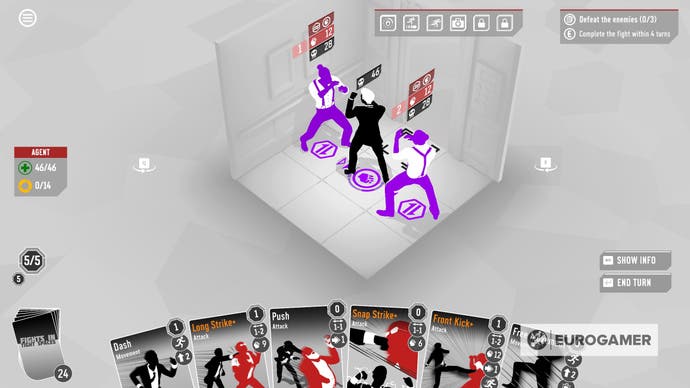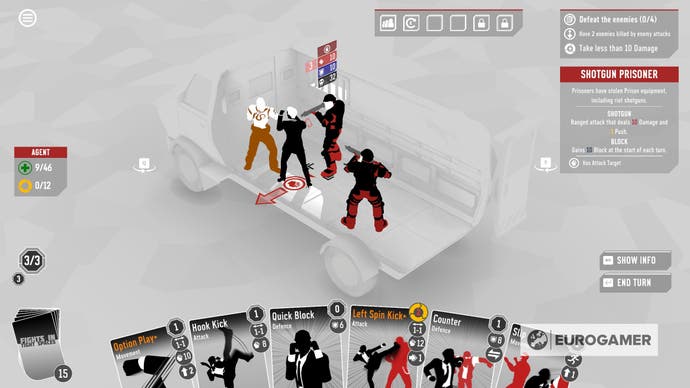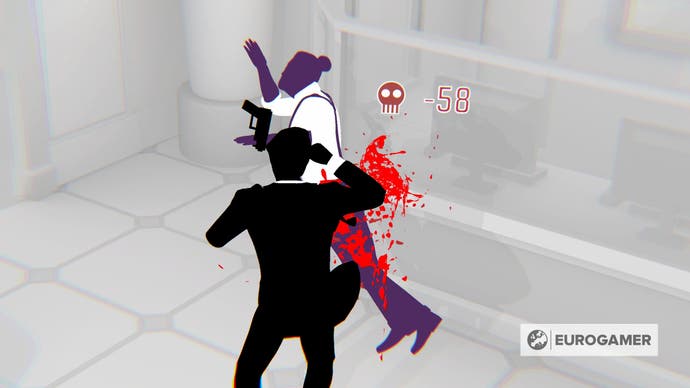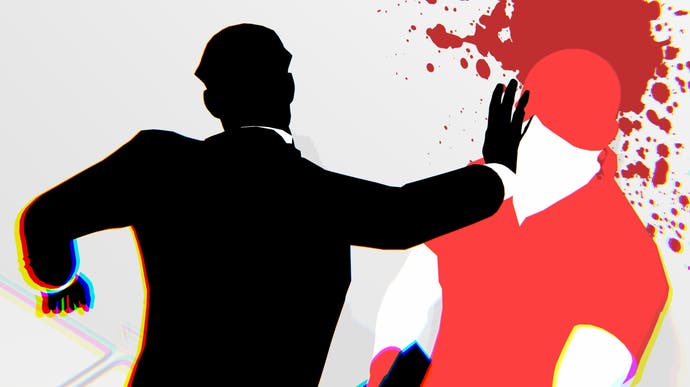Fights in Tight Spaces review - a strategical secret agent beat-'em-up that's almost there
A bit James Bland.
Fights in Tight Spaces is a turn-based recreation of those moments in spy films, or any kind of action film really, where the hero is suddenly surrounded in an enclosed area and there can't possibly be any way out. Except there obviously is, through a carefully choreographed fight scene, in which we get to see just how hard our hero is. They swirl around, a blur of arms and elbows, and all of a sudden enemies are punching each other and looking very confused, and a gun goes off, and someone's fighting with a towel for some reason, and then the scene ends in stillness as the hero stands triumphant amid bodies strewn around them. It's textbook stuff.
In Fights in Tight Spaces, you're that hero, a smartly dressed agent working for some James Bond-like organisation trying to take down some criminal organisations. And you have an impressive array of moves up your sleeve. You can leap off walls to propel attacks, you can roll over enemies while acrobatically taking them down, and you can smash heads into scenery. You can even jump-kick enemies either side of you, which is something I've always wanted to be able to do but I always end up kicking the television.
Exactly what your agent can do depends on your deck, for this is a deck-building game. There are a couple of ways of approaching this: build your own, or choose a pre-made deck and add to it as you play, upgrading the cards or removing them as you see fit, at stops along the way. You move through a map while stopping to fight, tinker with cards, heal, and risk random events. These pre-made decks are good by the way, built around themes like Aggressive, which I really like (it has the Wall Punch) or Slasher, which plays on the Bleed debuff. Crucially, these premade decks don't leave you short in really important areas like movement and defence, because it's not all about attack.
Fights in Tight Spaces is easily as much about getting out of harm's way as it is harming enemies. You don't have much health and it doesn't regenerate between fights, and you only have one life (on most of the difficulty levels - there are some easier modes with level-restart options). A good player conscientiously attacks while making sure they're not going to be hit in return.
In many ways, it's all about wriggling free, because the real puzzle of the game comes from negotiating safety while being surrounded by enemies in very "tight spaces", as the title says. As an idea of how claustrophobic it gets: the smallest play area I've seen was a grid of 3x3 squares, where I occupied one, and two enemies occupied others.
Fortunately, you have some inventive ways to get yourself out of trouble. Yes you have standard movement cards to move one or two squares one way or another, but better cards involve manipulating your enemy either at the same time, or instead. For instance, Shift allows you to step through an enemy to their rear, and leaves them facing the same way, usually ensuring you not only stride free of danger but you now blindside them for repercussion-free attacks. Or better yet, Grapple moves your enemy to an adjacent square around you, and faces them in that direction, which is really handy if you just want to pick them up and plonk them in harm's way instead of you. That's the real skill: putting them in trouble while you wriggle free.


Equally satisfying is booting them out of bounds, whether that be through an open door or over the side of a building - there are almost always breachable boundaries on a level. And doing this results in an instant kill, which means it's incredibly useful as enemies get tougher, and as lieutenants and bosses appear. I once killed a boss in two moves - two Front-kicks - hoofing them over the edge of a building, and because it was a boss, the battle ended there with a big score bonus for me (scores are only used as bragging rights as far as I can tell, but there are some bonus monetary rewards when meeting certain requirements, one of which is speed of completion).
But some enemies cannot be pushed, and some will face you as you dance around them, scuppering your plans to have them all facing - and hitting - away from you at the end of the turn. They will also increasingly gain special abilities of their own. And it's of the utmost importance you read these (by cursoring over them) because lapses in concentration can cost you your entire run in only a turn or two. Poof! Two hours of playtime sacrificed for one silly mistake. I've done it many times and it really stings. Concentration here is everything.
You can, however, skip straight to latter levels when you replay (there are four proper levels bookended by a tutorial and fancy final stage), but doing so means you miss out on all the upgrades along the way. To have the best chance at winning, you need to play from the start. This, however, becomes wearisome.
"What I really find myself longing for is another layer of attention, of decoration, of exuberance - something to increase the joy in playing it again and again."
There are few things which contribute to this feeling, I think. One, runs can take a long time, so to have it all undone so quickly leads, naturally, to a lot of frustration, which isn't easily shaken. It's particularly annoying when you lose because of something that could be tuned slightly better in the game, such as the ability to see (when you currently cannot) enemy turn-order. When you deal in the fine margins Fights in Tight Spaces does, every detail matters.
Two, most of the levels aren't that interesting to play. They get better, but there's a lot of repetition and many of them can feel quite robotic and as though you're slogging through them to get somewhere rather than enjoying them in their own right. And from this comes a feeling of laboriousness as you try again.
That's not to say there's no enjoyment in going back through, because even at a base level, Fights in Tight Spaces is engrossing, and there's always a thrill in taking care of a battle expeditiously. But what I really find myself longing for is another layer of attention, of decoration, of exuberance - something to increase the joy in playing it again and again. As it stands, it can be quite mechanical.

This is a wonderful subject matter after all, spies and hand-to-hand combat. Why is it so quiet when enemies are fighting, then? There's no bickering as they battle, no one-liners from the agent as they prevail. And why aren't there more props, be they special agent gadgets or pick-ups on the levels? Levels are just empty, and quiet, and it's weird (although the final stage is much glitzier and does involve a lot of talking).
I also wouldn't mind if the moves were dialled up a bit, to make you feel even more powerful, as well as the permanent Enhancement buffs you collect. It's as though everything needs an injection of more: more speed and more oomph, more over-the-topness. Even the sped-up replays you can watch at the end of a battle feel a bit unexciting, a bit flat.
Because of all this, Fights in Tight Spaces struggles in a battle all of its own: to convince you to play again. And it's a key battleground because the core design of the game depends upon it. It's so close, so nearly there. But as it stands it's a bit like a cake without icing: perfectly edible and enjoyable, but not all it probably could be.










